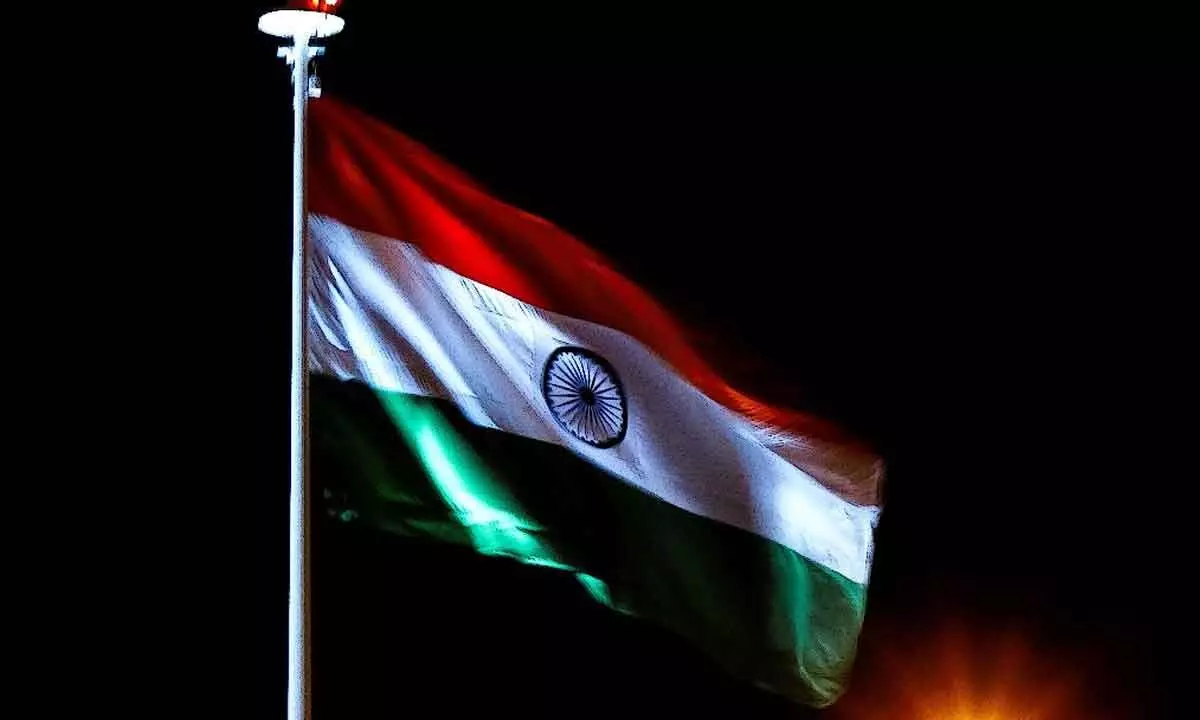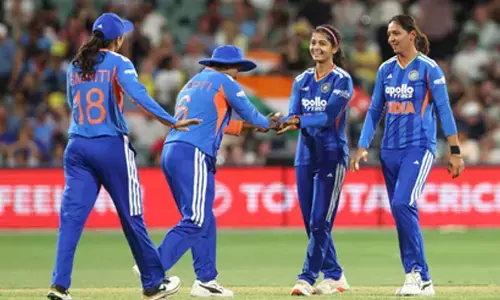‘Janani Janmabhoomischa…’

There have also been many instances where people left their Motherland and settled down in foreign countries where, through spectacular achievements, not only did they make a name for themselves, but also brought laurels to the land of their birth. Among many such are the legendary Albert Einstein, a native of Germany, who achieved greatness through his work in America and Rishi Sunak, of Indian origin, who, until recently, was the Prime Minister of England
From times immemorial, there has been a strong relationship between people and the country to which they belong. Motherland, if you wish, although, for a short while, the word Fatherland was used, during the days of World War II, by the Nazi establishment in Germany, as a part of propaganda, to appeal to the nationalistic spirit of the people.
In the Hindu epic, Mahabharat, Lord Rama, accompanied by his brother Lakshmana, enters Lanka after having slain King Ravana in battle. Lakshmana, taken in by the beauties and wonders of the Emerald Isle, suggests that Rama get crowned as the King of Lanka. Rama tells Lakshmana that mother and Motherland are greater than even heaven, – “Janani Janmabhoomischa Swargadapi Gariyasi.”
A similar sense of deep attachment to one’s Motherland led to the formation of Israel as a country in 1948. Palestine, the Promised Land, which God assured Abraham, the Hebrew patriarch of the Abrahamic religions including Judaism, Christianity and Islam, that He would give to Jews was at that time a part of Israel.
The history of the world is replete with instances of inspiring displays of devotion to one’s Motherland by patriotic individuals. In return, recognition and honours were conferred upon them by the people and the governments of grateful countries. There have also been many instances where people left their Motherland and settled down in foreign countries where, through spectacular achievements, not only did they make a name for themselves, but also brought laurels to the land of their birth. Among many such are the legendary Albert Einstein, a native of Germany, who achieved greatness through his work in America and Rishi Sunak, of Indian origin, who, until recently, was the Prime Minister of England.
The immediate inspiration for this article came from a message I recently received from Brij Kishore, my batch mate in the Indian Administrative Service. Brij worked for Economic and Social Commission for Asia and the Pacific (ESCAP) of the United Nations at Bangkok earlier and was for some time a visiting Professor at Duke University in the United States. During a recent visit with his daughter at San Diego, he came to know that James David Vance, now the Vice Presidential candidate of the Republican Party in the run-up to the next Presidential election in America, is the son-in-law of Chris Chilukuri, a neighbour of Brij’s daughter at San Diego. The message was to share his joy and happiness at the news, as Brij was given to understand that Usha Chilukuri, wife of Vance, is the granddaughter of a relation of our family.
That certainly was very good news, although, even after diligent enquiry, I have been unable to establish the relationship. That an Indian has done exceedingly well, as a lawyer in America, and is married to Vance, is certainly something to be proud and happy about.
And that set me thinking about other Indians who have done well away from their homeland.
The terms, NRI (Non-Resident Indian), PIO (Person of Indian Origin), and OCI (Overseas Citizen of India), are often used to describe individuals of Indian birth, or descent, living outside the country. While an NRI is an Indian who is a resident in a foreign country, a PIO refers to foreign nationals whose roots lie in India, as does an OCI, albeit with some purely technical matters distinguishing it from a PIO.
An impressively large number of such persons have acquainted themselves exceedingly well in many countries, especially in America and the United Kingdom. Their contribution, especially in areas such as exploration of outer space, and computer software, has been highly valuable in the USA. In the Silicon Valley in California, known for its outstanding contributions to computer technology and in the National Aeronautics and Space Administration (NASA), NRIs have excelled through their outstanding contribution.
Some exceptionally successful individuals deserve mention here. Satya Nadella, for example, an NRI business executive, is the Chairman and Chief Executive Officer (CEO), of the internationally renowned multinational giant Microsoft. In 2022, the Government of India awarded him the Padma Bhushan, the third highest civilian award of the country. Likewise, Pichai Sundarrajan, an NRI business executive and the CEO of Alphabet is also a Padma Bhushan awardee. Another renowned NRI is the Punjab – born genius, Narendra Singh Kapany, known for his exceptional contribution to the field of fibre optics and is included by Fortune magazine in the list of seven ‘Unsung Heroes’.
No less significant was the contribution to the field of astrophysics, the sensational work of S Chandrasekhar known for his Theory of Black Holes, which earned him the Nobel Prize. A phenomenon associated with the collapse of stars, is, in fact, named the first Chandrasekhar Limit. An equally significant contribution was made by NRI Har Gobind Khurana, who was awarded the Nobel Prize for medicine. Another distinguished Nobel Laureate, of Indian origin, is the celebrated welfare economist Amartya Sen. Yet another is Mumbai born Zubin Mehta, one of the world’s leading conductors and the ‘Music Director for Life’, of Israel’s Philharmonic Orchestra, is famous for his stage presence and showmanship.
Then there is Mira Nair, whose claim to fame is the notable contribution she has made to the field of film making, through movies which depict the economic, social and cultural aspects of Indian society. She was awarded the Padma Bhushan for her global, acclaimed work. Interestingly enough, she also received an offer to direct the movie ‘Harry Potter and the Order of the Phoenix’, which she rejected! Other women who have excelled by their performance in different fields include Kalpana Chawla, the first Indian woman to fly into outer space and Indra Nooyi, formerly the Chairman and Chief Executive Officer of PepsiCo, the second largest food and beverage business in the world. With a view to according appropriate recognition to the work done by NRIs, PIOs and OCIs, and also in order to promote better understanding, abroad, of India and its people, the Government of India has instituted several measures. The PIO Card scheme, launched in 1999 in order to make the journey back to one’s roots simpler, easier, flexible, and hassle free, has been revised and improved recently. An annual award, called the Pravasi Bharatiya Samman award, the highest honour that can be conferred on expatriate Indians, has also been instituted. It is given to individuals, organisations or institutions who have made significant contributions, in identified fields of activity, which include support to Indian causes and concerns, building closer links between India and the Indian Diaspora abroad and outstanding performance in a field that has served to enhance India’s prestige in the country of residence, philanthropist and charitable work.
When all is said and then, however, it needs to be appreciated that being an expatriate Indian can be a double edged sword, as those who have gone in search of greener pastures, especially to countries, such as the USA will tell you. America is a land of opportunity where talent, hard work and the determination to succeed, will take you to heights not easily available in developing countries such as India. The flip side, however, is that education and health services, while exceedingly good in terms of quality, can be extremely expensive. Also, children grow up in alien environment, which can, occasion, even be unfriendly if not hostile. Their sense of attachment, to the values that the parents cherish, will also be in danger of becoming fragile. And, over time, one will also begin to miss the sense of belonging and social relevance, which are integral parts of the ambience back home.
It is heartening to note, however, that many people nowadays are able to overcome the challenges of the crisis of belonging, with a series of measures. For one thing, children, in many Indian families, are now being brought up in a way which infuses in them the essential qualities of the Indian way of living, much more than even, perhaps, their counterparts back in India. So, after all, it is possible to have the best of both worlds! Or, to use a cliché, some people are lucky enough not only to have the cake, but eat it, too!
(The writer was formerly Chief Secretary, Government of
Andhra Pradesh)








